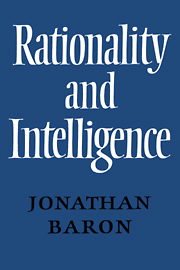Book contents
- Frontmatter
- Contents
- Preface
- 1 Introduction
- 2 Rational choices and plans
- 3 A theory of thinking
- 4 The scheme fleshed out: a decision–theoretic analysis of thinking
- 5 Conditions of effective thinking
- 6 Effects of rational thinking on the individual and society
- 7 The teaching of rational thinking
- References
- Index
6 - Effects of rational thinking on the individual and society
Published online by Cambridge University Press: 05 October 2009
- Frontmatter
- Contents
- Preface
- 1 Introduction
- 2 Rational choices and plans
- 3 A theory of thinking
- 4 The scheme fleshed out: a decision–theoretic analysis of thinking
- 5 Conditions of effective thinking
- 6 Effects of rational thinking on the individual and society
- 7 The teaching of rational thinking
- References
- Index
Summary
I have argued that intelligence consists in part of a disposition to follow the rules of good thinking and to avoid the biases that often interfere with such conduct. In this chapter, I ask, what is the good of being rational in this way? This question is necessary as a justification of any attempt to teach people to think more rationally (chapter 7). There are three answers. First, rationality is good because it can be expected to increase individual happiness or fulfillment. Second, rationality makes for effectiveness, in the sense of chapter 1, that is, success at achieving rationally chosen goals. This must be shown in order to complete the argument that rationality is part of intelligence. Third, I argue that rationality has a kind of external justification, in particular, a moral one, of the same sort that other moral traits such as honesty might have.
Rationality and happiness
People who are healthy, wealthy, and wise are not necessarily happy as well, but it helps; few would trade their wealth and learning for the supposed bliss of the ignorant and poor. Health, wealth, and knowledge can be thought of as “primary goods” (Rawls, 1971), which would help anyone achieve his goals, no matter what those goals might be. The relation between rationality and happiness is of a similar sort. In particular, rationality in making decisions and plans can be defined as the following of rules that are likely to lead to consequences that would be desired on reflection (chapter 1).
- Type
- Chapter
- Information
- Rationality and Intelligence , pp. 206 - 243Publisher: Cambridge University PressPrint publication year: 1985



